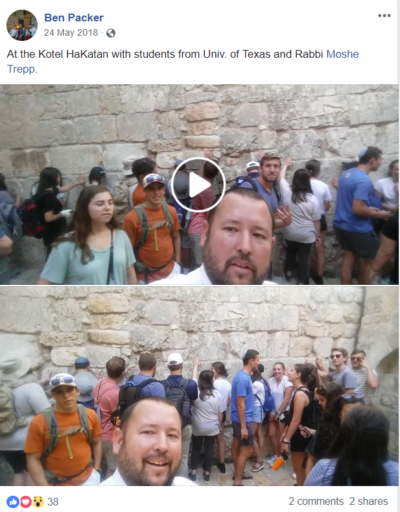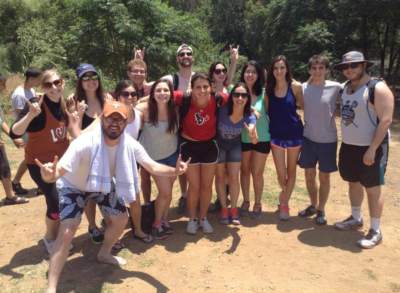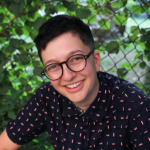Walking through Jerusalem’s Old City, the tour guide brandished his gun in front of a group of students from the University of Texas (UT) at Austin.
“I’ll shoot,” he said. “I’ll shoot an Arab if I have to. I’m not scared.”
Ben Friedman, a business honors major at UT, remembers this moment well. He was in Israel on a trip led by then-Hillel staff Rabbi Moshe Trepp, and for the most part, he was having a great time. Meeting this tour guide, though, made him feel “nauseous.” The guide made several broad generalizations about Arabs, he said, and came off as “discriminatory, disrespectful, aggressive, extreme.”
Friedman didn’t remember the tour guide’s name, but his description matched one that several other students had provided to New Voices. Sitting on a bench in the McCombs School of Business, New Voices reporter Ben Sharp pulled up a photo of fringe, far-right nationalist Ben Packer on his phone and handed it to him. “Was it this guy?”
Friedman sucked in his breath – it was.

Trepp, the leader of this annual trip to Israel, told New Voices in November 2018 that their time with Packer was an unplanned accident. The group happened to bump into Packer, a “very dear friend” of Trepp’s, and Trepp asked him to give them a tour. In January 2019, Trepp told New Voices that he and his students have encountered Packer “many times” over the years, and there has been at least one other unofficial tour. When reached for comment in January, Packer hung up on a New Voices reporter.
At UT Austin, Jewish students can visit Israel on the Jewish Learning Fellowship (JLF) trip (as Friedman did), or a Birthright trip through either Hillel or Chabad. Texas Hillel, which serves 2,750 Jewish undergrads at the large state university, has a conservative reputation (reflected in the political donations of its board, which skew sharply to the right). For many years, Rabbi Moshe Trepp helped lead both the Birthright and JLF trips as a Hillel staff member.
However, while Texas Hillel has information about Birthright on their website, the JLF trip is advertised by “word of mouth” only, Trepp says. (Trepp has also advertised the trip on Facebook). And while Birthright doesn’t openly take students across the Green Line into West Bank settlements, the JLF trip does, making stops in Gush Etzion, Hebron, and Rachel’s Tomb.
Of the students New Voices spoke to who had attended the JLF trip, none recall meeting with Palestinians. But several remember meeting Ben Packer, an outspoken supporter of the militant Rabbi Meir Kahane, who was linked to acts of domestic terrorism before his assassination in 1990. Packer was also recently exposed as a funder of Canary Mission, a shadowy website that posts the personal information of college students and faculty who criticize Israel.
New Voices began reporting this story in November, 2018. On January 11th, 2019, Trepp announced his resignation from Hillel, after a photo of him posing with students on a Birthright trip next to what appear to be lines of cocaine made its way to Texas Hillel Director Maiya Chard-Yaron. According to Trepp, the lines were sugar, and part of “a running joke throughout the trip.” Nevertheless, he resigned shortly after.
Trepp plans to continue leading the JLF trip every year, because although he was a Texas Hillel employee, he claims that Hillel never funded, advertised, or oversaw this trip. (In a statement, Chard-Yaron wrote that the trip “is a separate program from Texas Hillel”).
In fact, Trepp doesn’t call it the JLF trip – he calls it the Trepp trip. “It’s all Trepp,” he said. “The entire thing is Trepp from beginning to end.”
——————————————————————-
Trepp began leading his Israel trip years before he connected with Hillel, he says. He also taught a course for students called the Jewish Learning Fellowships (JLF), which surveys a broad range of Jewish religious and cultural practices. He moved to Austin in 2006 and started teaching his course in rented space on and off campus, and taking UT students to Israel.
At the time, Trepp’s salary was funded directly by Olami, an international network associated with the Orthodox organization Aish Hatorah. In 2016, Olami (along with Hillel and Chabad) received over $20 million from the Israeli Ministry for Diaspora Affairs as part of their project to strengthen the connection between diaspora Jews and Israel. The money is administered by Mosaic United, who were criticized by leaders of Reform and Conservative movements for prioritizing Orthodox organizations, while the majority of Jewish college students in the U.S. are non-observant.
A few years after moving to Austin, Trepp says he was approached by Texas Hillel, and asked if he would lead his same programming under their auspices.
“They have someone running programs out of Hillel that doesn’t cost them anything, and I get a place to [run] my programs. It’s perfect.” According to Trepp, Olami continued to pay his full salary, which he received through Hillel. He says Hillel also provided him with health insurance.
Eventually, he was granted a new, informal title: instead of being just a Rabbi at Hillel, he became the Hillel Rabbi.
At UT Austin, there are few options for students seeking rabbinic counsel. Chabad employs one Orthodox rabbi, and Hillel does not currently have a rabbi on staff. However, Trepp is able to interact with Jewish students outside of a campus religious organization, or any oversight from the University. He also recently hired Yaakov Rubin, another rabbi, to work directly for him.
Many students see Trepp as a mentor, someone who knows them more personally and is more consistently available than professors or staff. He is often described as warm, inviting, and approachable. As Rachel Sasiene, a 2018 graduate, put it, “He’s probably one of the happiest, most joyous people you’ve ever met…He is just excited to share his knowledge with you in any way that he possibly can.” When asked why they signed up for the JLF trip, many students said their main reason was Trepp himself.
Although Trepp led the JLF out of a Hillel building, and Texas Hillel advertised the course on their site, he doesn’t see it as Hillel programming. The Jewish Learning Fellowship is a national, Hillel-partnered 10-week seminar that offers $300 to students who complete it. Trepp’s JLF is also a 10-week seminar with a $300 stipend, but he says he writes the curriculum himself. In a statement, Matthew Berger, vice president of communications at Hillel International, confirmed that Trepp’s program is not affiliated with the Jewish Learning Fellowship operated by Hillel International.

Although Trepp describes the JLF as a project that is entirely his own, it maps very closely on an international Olami program called Olami Inspire, another 10-week seminar with a $300 stipend. This program gives the option of either the $300 stipend, “or a highly subsidized (nearly-free) trip to Israel.” Trepp gives his JLF students a similar choice – take the stipend, or put it towards the cost of his Israel trip ($599 per student). (Trepp says he fundraises within Jewish Texan communities to cover the full cost of the trip).
Trepp says he has never heard of Olami Inspire, and that Olami has no input into his JLF curriculum. However, he says that the funding he receives from Olami, which includes the student stipends, does affect the structure of his programming.
“I’m sure you can tell me the name of a program that seems similar to mine in Iowa, in Florida, in California – they’re all going to look very similar… because it’s all the same funders,” he said, referring to Olami.
Olami representatives did not respond to multiple requests for comment
Sarah*, a 2018 graduate, was involved with Hillel and a Jewish sorority during the beginning of her time at UT. Through Hillel, she was on the planning committee for their annual “Israel Block Party,” but found herself becoming less involved as her politics moved to the left. She decided to participate in the JLF largely because of the stipend involved, “a pretty sizable chunk of change” for a student.
Trepp has led the JLF with Rabbi Yaakov Kirschbaum, who he hired to work for him using Olami funding. Kirschbaum is Orthodox, and Trepp was ordained at the Mir, an Orthodox yeshiva in Jerusalem. Sarah wasn’t anticipating a seminar from an entirely Orthodox perspective, and isn’t sure if she would have signed up if she’d known. It was the last class that she found most off-putting, though – a discussion of the role of women in Jewish spaces.
“[Trepp] said that because women are more spiritually elevated and so much better people than men are, they don’t need to do the same things as men, like…wear tallit or pray in the same room or go on the bimah.” When she heard this, Sarah felt upset, and didn’t feel that she could speak out. “I would have never said anything against him in that space,” she said.
When asked about this class, Trepp confirmed that he teaches that women are on “a higher level” than men. However, he was surprised to hear there had been complaints. “Everyone says it’s the best class of the entire JLF,” he said.
Sam*, another 2018 graduate, participated in the JLF with Sarah. He was involved with a Jewish fraternity and Texans For Israel, a Hillel-affiliated campus group. The class that stood out to him during the JLF was the one about kosher slaughter. At one point, he says, Trepp compared kosher and halal approaches to animal slaughter.
Sam remembers Trepp saying, “‘I don’t even know what they do. They just take the cow and start sawing its head off and go HALALALAL.’ He started shouting in gibberish. Not even trying to speak in Arabic. I doubt he knows any Arabic.”
Sarah remembers Trepp shouting gibberish as well. “It was terrible,” she said. “He was saying that kosher is so much better. Again creating these levels that don’t need to exist.”
Trepp says that while he discusses the differences between kosher and halal slaughter, he did not pretend to shout in Arabic.
“The JLF is just Jewish learning on campus. There’s nothing political about it…just traditional Judaism,” he said.
For Sarah, it was upsetting to realize that Hillel hosted and promoted this fellowship. “Maybe the funding that pushed us to go to those classes didn’t come from Hillel, but it doesn’t matter because it’s like your uncle giving you money, and your aunt is like ‘Happy Birthday!’ They’re both giving you the gift. It’s the same thing. [Hillel is] completely responsible for what happens within their walls.”
Chard-Yaron, the Texas Hillel director, wrote in a statement, “Texas Hillel did not receive any complaints regarding the curriculum of the Jewish Learning Fellowship while it was led by Rabbi Trepp. We believe strongly in creating a space that is welcoming for all Jewish students with different backgrounds and perspectives and work to ensure all of our programs challenge students in a safe, educational environment.”
For both Sam and Sarah, their discomfort with the JLF came to a head during an end-of-semester Shabbaton in Houston in late 2016. When they signed up for the JLF, neither knew that attending the Shabbaton was a requirement for receiving their stipend. However, Trepp confirmed to New Voices that this is indeed the case. “If you want the money at the end,” he says, “then you have to have the whole experience.”
Sam, Sarah, and their classmates were having dinner at the home of Aryeh Wolbe, a Rabbi involved in Jewish education in Houston. Wolbe’s organization, TORCH (Torah Outreach Resource Center of Houston), is affiliated with Olami. Trepp confirms that Wolbe hosted a Shabbat meal for him and his students.
“All of [Wolbe’s] kids were in Trump clothes,” Sarah said. “[They] were in Make America Great Again t-shirts and hats, and were coming up to us and asking if we support Trump, why don’t we support Trump.”
Wolbe did not respond to multiple requests for comment.
Sam has had conversations with Trepp, outside of the Shabbaton, in which Trepp expressed support for Trump, mentioning Trump’s support for Israel. But in this setting, “the ways that he made his own political views known were a little too clear for my liking,” he said. “There is an assumption that as a religious leader in a community you will abstain from such overt political leanings.”
Trepp denies speaking to a student about his political views, although he says he is a Republican. “Students don’t know where I stand politically, they don’t know whether I’m Republican or Democrat, they don’t know whether I’m pro-Israel or anti-Israel. I never speak politics with my students, on or off my programs.”
Rachel Sasiene graduated from UT in 2018, and participated in the JLF during her sophomore year. After completing the course, she was offered “a trip to Israel through the same program,” which she took, knowing that the itinerary was written by Trepp himself
Until recently, the JLF trip occupied a strange and ambiguous space, neither Hillel-endorsed nor disavowed. No one denies, though, that the pull of the trip is strong. When Sasiene decided to join, she had already been to Israel on Birthright but was looking for something more. Trepp’s trip, she said, was “described as not like Birthright at all. He was going to take me to places that Birthright didn’t take you.”
This is part 1 of 2. To read Part 2, click here.
Ben Sharp contributed reporting to this series. Ben is a native of Teaneck, New Jersey and a student at The University of Texas at Austin, pursuing degrees in the Plan II Honors Program and International Relations and Global Studies.
*These students’ names have been changed.
Featured image source: https://www.utexas.edu/.

